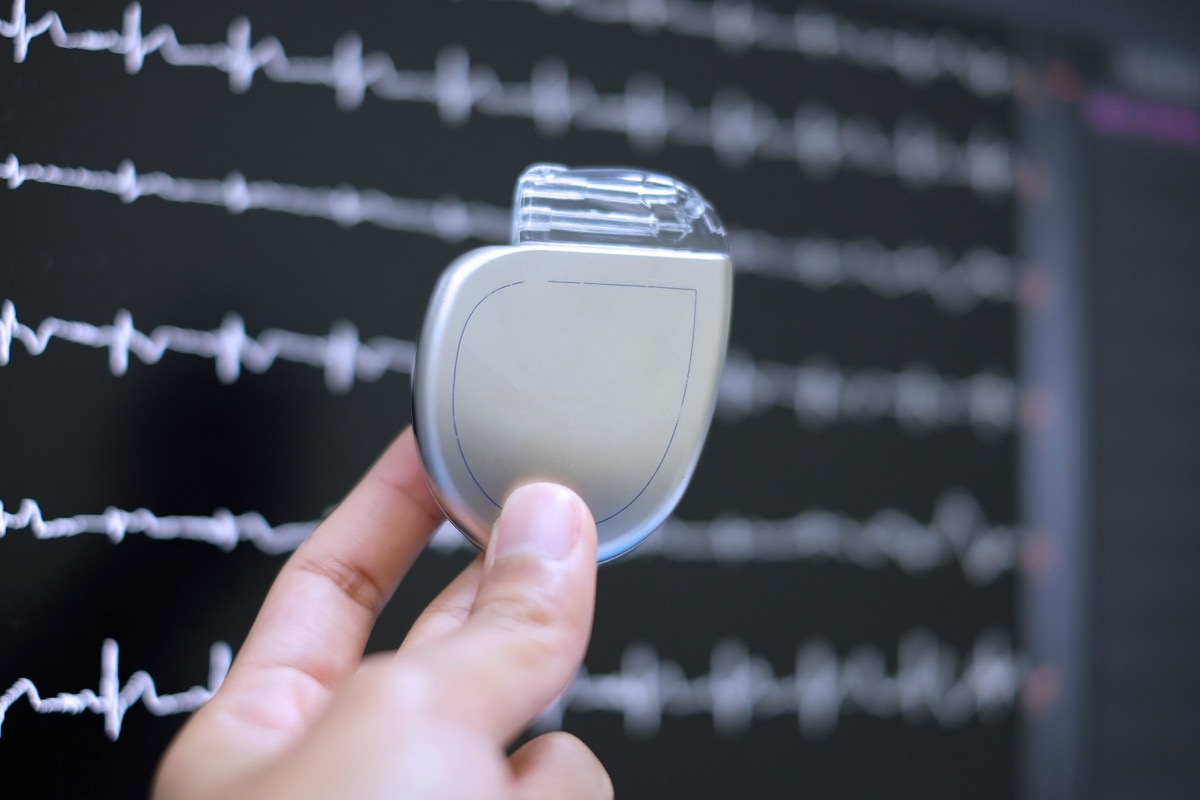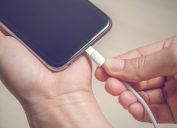Apple Just Released This Warning About the Latest iPhones
Some doctors have expressed concerns about the magnets inside the new devices.

There's a very good chance you use an Apple device every day. It could be your phone, as nearly half of all smartphone users in the country use an Apple iPhone as of 2021, according to Statista. But there may be cause for concern for some of the 113 million iPhone users in the nation. Apple recently released a warning about the latest iPhones, and how certain people could be affected by one of the devices' key features. Read on to find out if your phone could be putting you in danger, and for more words of warning, If You're Charging Your iPhone Like This, Apple Says Stop Immediately.
Apple released a warning about how iPhone products may interfere with certain medical devices.

Apple released a warning on Feb. 25 detailing how Apple products may interfere with the medical devices used by some people with heart conditions. According to the statement, all MagSafe accessories—which were created to allow and aid the iPhone 12 in charging wirelessly—contain magnets, while both the MagSafe Charger and MagSafe Duo Charger also contain radios.
"Medical devices such as implanted pacemakers and defibrillators might contain sensors that respond to magnets and radios when in close contact," Apple explained in their statement. "To avoid any potential interactions with these devices, keep your iPhone and MagSafe accessories a safe distance away from your device." According to Apple, this safe distance is more than 6 inches apart, and more than 12 inches apart when wirelessly charging. And for more on this smartphone, There's One Big Problem With the New iPhone, Users Say.
The company said iPhone 12 models are not expected to be bigger risks than previous models.

According to Apple, all iPhones contain magnets, components, and radios that "emit electromagnetic fields," which can possibly interfere with medical devices. While the company did acknowledge in their statement that the new iPhone 12 models "contain more magnets" than previous iPhones, they don't expect the newest device to increase the risk. "Though all iPhone 12 models contain more magnets than prior iPhone models, they're not expected to pose a greater risk of magnetic interference to medical devices than prior iPhone models," an Apple spokesperson emphasized to Best Life on March 19.
Doctors conducted an experiment that showed the iPhone 12 Pro deactivating a defibrillator.

Gurjit Singh, MD, a cardiologist with the Henry Ford Heart & Vascular Institute, conducted an experiment with his colleagues to see how an iPhone 12 Pro affected a patient with an implantable defibrillator, publishing their findings Jan. 4 in the HeartRhythm medical journal. According to Singh, cardiac devices have switches that respond to external magnets in order to control the way they function, since surgery cannot be performed every time doctors need to control a person's device.
"When we brought the iPhone close to the patient's chest, the defibrillator was deactivated. We saw on the external defibrillator programmer that the functions of the device were suspended and remained suspended. When we took the phone away from the patient's chest, the defibrillator immediately returned to its normal function," Singh revealed in a statement. "We were stunned. We had assumed that the magnet would be too weak in a phone to trip the defibrillator's magnetic switch." And for more heart concerns, If You Can't Do This in 90 Seconds, Your Heart Is in Danger, Study Says.
Doctors say this glitch could have fatal consequences.

In his statement, Singh noted that strong magnets can cause a pacemaker to deliver electrical impulses that make the heart beat out of sync, which could result in a potentially lethal condition called ventricular fibrillation. "We believe our findings have profound implications on a large scale for the people who live daily with these devices, who without thinking, will place their phone in their shirt pocket or upper pocket or their coat—not knowing that it can cause their defibrillator or pacemaker to function in a way that could potentially be lethal," he said. Singh and his colleagues are reportedly preparing to launch a larger study on all major brands of defibrillators and pacemakers to find out if they are affected by the strong magnets in the iPhone 12 and other portable devices.
Apple says those who use medical devices should talk to their doctor about possible complications.

Apple recommends that people who use medical devices consult their physician and medical device manufacturer for "information specific to your medical device and whether you need to maintain a safe distance of separation between your medical device and iPhone or any MagSafe accessories."
"Manufacturers often provide recommendations on the safe use of their devices around wireless or magnetic products to prevent possible interference. If you suspect iPhone or any MagSafe accessories are interfering with your medical device, stop using your iPhone or MagSafe accessories," Apple said in their warning. And for more Apple updates, If You Own Any Apple Devices, You Need to Do This Immediately.





















